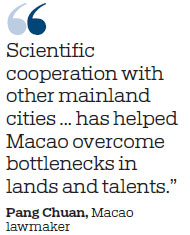Rising research star ready to shine
A lesser known fact about Macao - a region heavily dependent on tourism - is that it has morphed into a rising star of the nation's technology development.
In some prioritized areas, such as the studies of traditional Chinese medicine and planetary science, Macao's research is now top level and rapidly approaching that of the international leaders in the field.
In the two decades since its return to the motherland, Macao has established four national-level laboratories carrying out research in TCM, planetary sciences, microelectronics and the internet of things.
The State Key Laboratory of Quality Research in Chinese Medicine, established in 2011 and jointly operated by the University of Macau and the Macau University of Science and Technology, is the nation's only laboratory focusing on TCM studies.
Partnering with Peking Union Medical College, the lab received second prize at the State Scientific and Technological Progress Award in 2016, for creating the world's largest database of DNA bar coding technology to identify medicinal plants around the world.
In 2011, Macao and Guangdong province co-established a 50-hectare TCM science and technology park in the Hengqin New Area of neighboring Zhuhai.
By April, 134 enterprises had registered in the park. Besides enterprises, the park also attracted a number of overseas government-backed bodies and business associations, mainly from Portuguese-speaking countries.

With extensive overseas connections, the park has also served as a gateway for the promotion of TCM medicines and therapies on the global stage.
The newest of the labs is MUST's State Key Laboratory of Lunar and Planetary Sciences founded last year.
Despite its relatively short history, its research team has vast experience in the field and has had a number of papers published in leading academic journals, such as Science and Nature.
Xu Aoao, MUST's president and chairman of the Association for the Promotion of Science and Technology of Macau, attributed the progresses to national support and opportunities for Macao's scientific institutions to participate in national projects.
Since the Chang'e lunar exploration project kicked off in 2003, MUST has been deeply involved in related research. It was the first university in Hong Kong and Macao to play a role in the project. "Since then, we have taken the lead in this area and kept consolidating that advantage until now," Xu said.
Macao lawmaker Pang Chuan, who is also MUST's vice-president, stressed the importance of cross-boundary collaboration in technology development.
"Scientific cooperation with other mainland cities, especially the nearby cities in Guangdong province, has helped Macao overcome bottlenecks in lands and talents," Pang said.
bingcun@chinadailyhk.com
(China Daily Global 09/10/2019 page5)


















